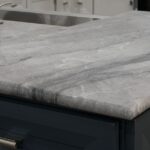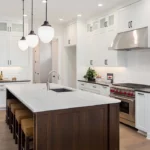So you long for a kitchen design revamp – and who can blame you? In today’s time, we face several possibilities when it comes to achieving the desired aesthetics and practicality of a living space. In this sense, natural stones are unmatched, especially quartzite slabs. If you clicked on this article in your never-ending search for perfection, maybe it’s time for quartzite kitchen countertops to conquer your heart.
Keep reading to learn the intricacies behind these high-demanded products, be inspired for your next project, and see some of the options that await you.
Read as well: Why Use Quartzite Bathroom Countertops
What are quartzite kitchen countertops?
In short, kitchen quartzite countertops are natural stone slabs that, once quarried and processed by stonemasons, are installed somewhere in a residential or commercial kitchen. They can serve as the main counter for cooking – being a part of the sink and cooktop framework – or used to conceive a kitchen island, which usually accompanies a nice set of cabinets and is built to fit the overall theme of the house.
By any means, from a technical and visual perspective, quartzite kitchen countertops compete with marble and granite in the current interior design market, making for one of the go-to options for homeowners looking to spice up their ambiance. That said, quartzite has the upper hand in several factors, as we’ll see in the other sections of the article.
Quartzite kitchen countertops are highly prized for their durability, beauty, and resistance to heat and scratching, which are perfect characteristics to withstand daily activities. Besides, quartzite slabs often come in various colors, patterns, and veining, adding a touch of elegance to the space while offering practical benefits due to their robust nature. They can be polished to a glossy finish or left with a more natural texture, depending on personal preferences and design aesthetics.
The benefits of quartzite kitchen countertops
In the long run, quartzite slabs offer everything you would value in a surface: reliability, low maintenance, resistance to impacts and spills, and lasting beauty.
However, before making any permanent decisions, just be aware that quartzite countertops need to be sealed, which is a big factor in your eventual maintenance routine. Quartzite is a porous natural stone – just like granite and marble – and to avoid major water stains and cracking, a sealer must be applied to its surface at least once a year. Read all about sealing quartzite in this detailed tutorial.
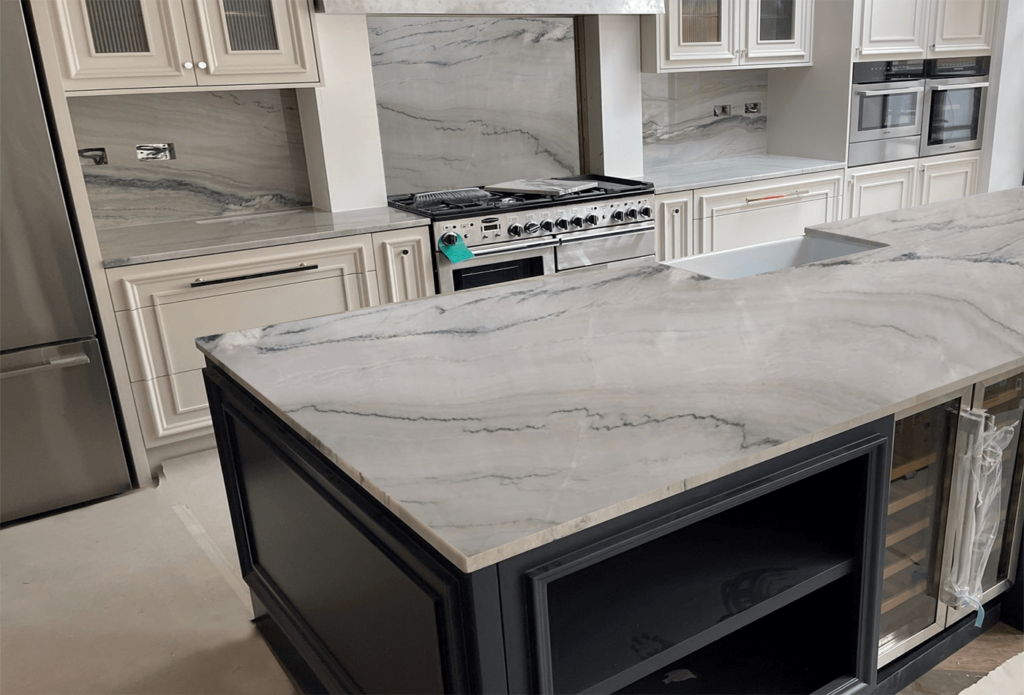
Here are the main benefits of choosing quartzite slabs for your kitchen:
- Quartzite is a natural stone that is extremely hard and durable. It can withstand daily wear and tear, resist scratches, and is less likely to chip or crack compared to other materials.
- Quartzite is heat-resistant, making it suitable for constant kitchen use. It can withstand hot pots and pans without damage, which is important for a busy cooking space, although it’s always recommended that things such as cutting boards be present to avoid unnecessary damage.
- They have a beautiful and elegant appearance, often resembling marble in terms of veining and color variations. That makes quartzite a desirable option for those who want the look of marble but with greater durability.
- While quartzite is not entirely stain-proof, it is relatively resistant to staining compared to some other natural stones. As mentioned, proper sealing can further enhance its resistance to stains.
- Regular cleaning with mild soap and water is usually sufficient to keep them looking great. Periodic resealing is recommended to protect against stains and ensure longevity.
- For those who appreciate the beauty of natural stone, quartzite provides a more authentic and unique appearance compared to engineered stones like quartz.
Don’t miss: The Best Quartzite Countertops Available
The difference between quartz and quartzite
Well, the main difference here is simple: quartzite is natural, whereas quartz is a manmade product that comes from quartzite.
Quartzite is formed when sandstone undergoes a process of heat and pressure deep within the Earth’s crust, causing it to recrystallize and become much harder and more durable than its parent rock, sandstone. Quartz countertops, on the other hand, are engineered stone surfaces made primarily of quartz crystals (typically around 90-95%) bound together with resins and pigments. In other words, they are manufactured in a controlled environment, while quartzite is collected from natural quarries.
The primary thing to consider, then, lies in their composition, formation, and versatility. Quartz is non-porous – meaning it doesn’t have to be sealed like quartzite – and can be found in a vast array of artificial colors on the market. That said, each has its own set of advantages and considerations, so the choice between them often depends on personal preferences, budget, and specific application requirements.
Fortunately, Eagle Stones works with both. Click here to check out the online catalog.
Design suggestions
Our following design suggestions provide starting points for creating a kitchen that aligns with your style and preferences. Feel free to customize and combine elements to craft a space that reflects your unique taste!
Timeless elegance with white quartzite
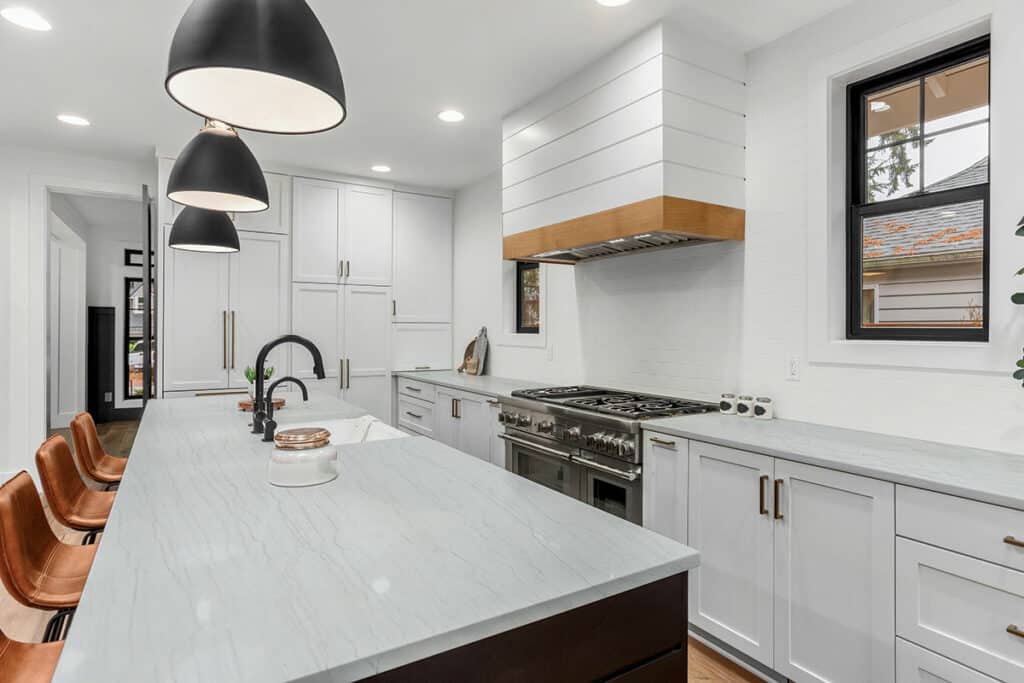
Create a kitchen exuding timeless elegance by incorporating white quartzite countertops that mimic the luxurious look of marble with subtle veining. Maintain a fresh and open ambiance by pairing the white countertops with classic white or light-colored cabinetry. For a modern touch, integrate stainless steel appliances, and introduce warmth through elements like natural wood flooring, furniture, or accents.
Modern contrast with dark quartzite
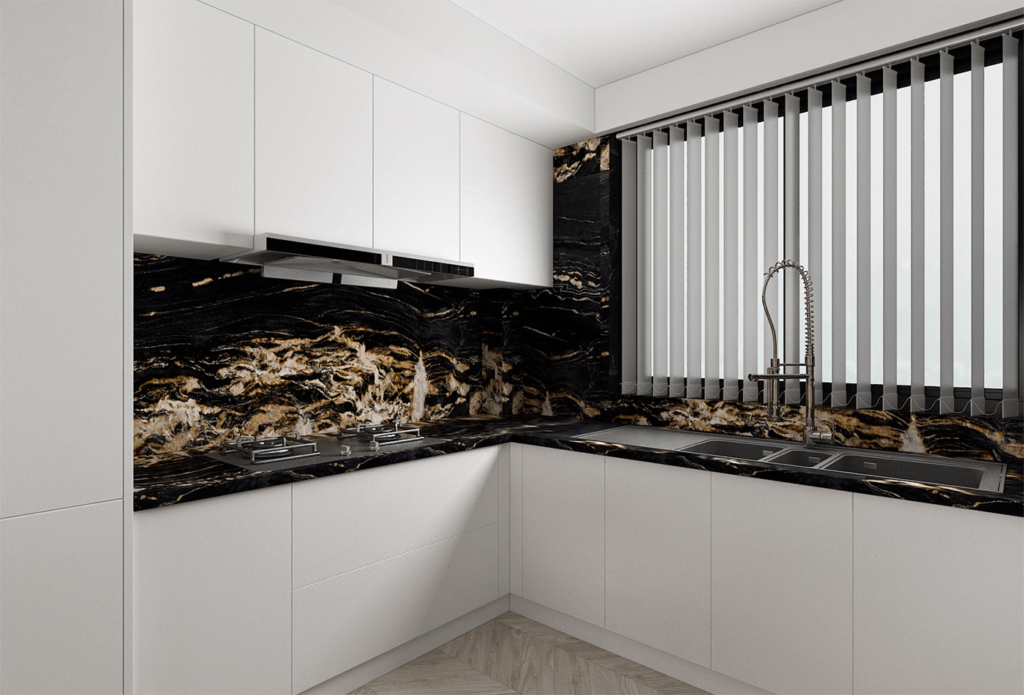
Achieve a modern and dramatic kitchen aesthetic by choosing dark-colored quartzite, such as deep gray or black, for the countertops. Create a striking visual impact by contrasting the dark surfaces with light-colored cabinetry. Enhance the contemporary look with sleek, handleless cabinets and appliances in stainless steel or matte black. Illuminate the space and add sophistication with pendant lighting or strategically placed under-cabinet lighting.
Earthly warmth with brown quartzite
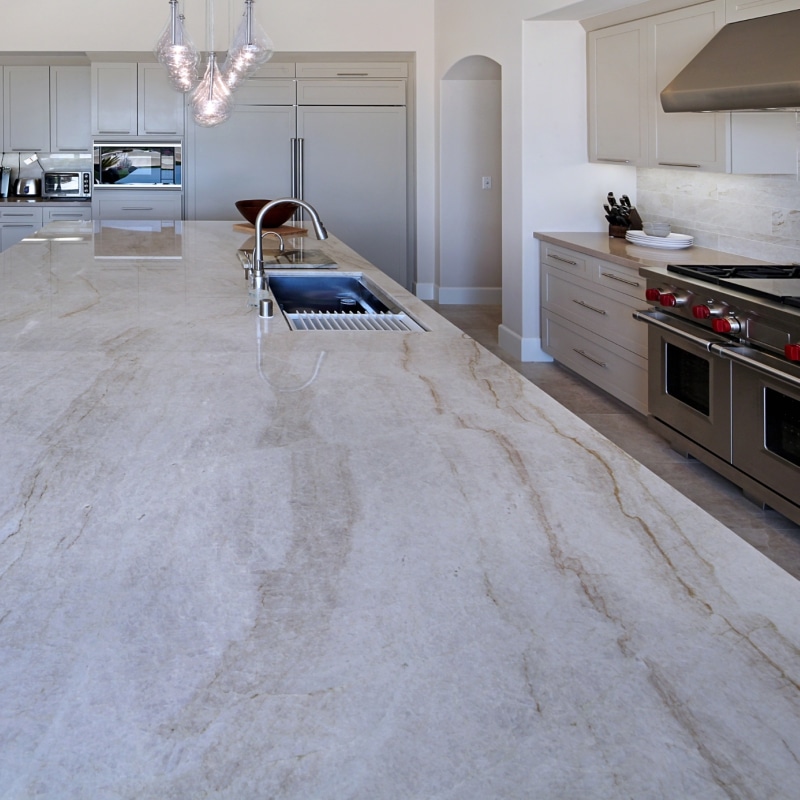
Infuse your kitchen with a cozy and earthy feel by opting for warm brown quartzite countertops. Amplify the warmth by pairing the brown surfaces with rich, wooden cabinetry. Complement the quartzite with an earthy-toned backsplash, such as warm beige or muted green tiles. Integrate natural elements, such as potted plants or an herb garden, to bring a touch of nature into the kitchen and complete the inviting atmosphere.
Contact Eagle Stones to see our top selection of quartzite slabs!
If you live near Sarasota, Florida, we have the right catalog of quartzite countertops for you. We work with a variety of natural stones from all over the world – including granite, marble, onyx, and quartzite. We can even go to your home to give you a free estimate!
Get in contact with our team to start planning your kitchen renovation today!

